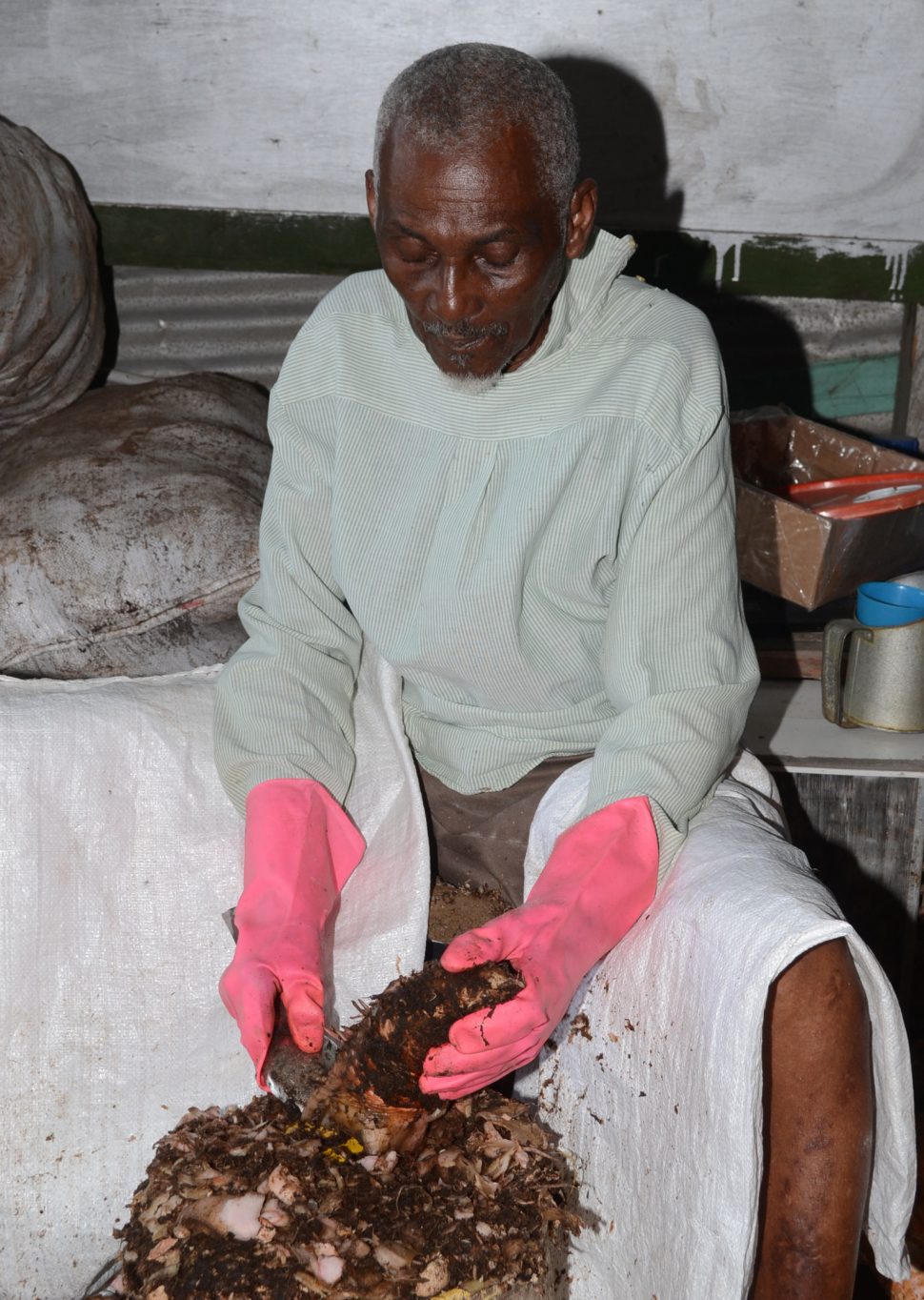We met 79-year -old John Caesar at his place of business, named Caesar’s Logi and situated at 160 Pineapple Street Linden. When we got there he was peeling a pile of eddoes with what appeared to be a sharpened pot spoon. You could tell from the deft manipulation of his wrists and the swiftness with which the dark skin disappeared from the eddo leaving the white flesh exposed that his skill has been honed over time.
He was carefully covered with some garment to protect his skin from the familiar itching that comes from contact with eddo. Oddly enough, while he is unquestionably ‘the boss’ the unenviable task of peeling eddo falls to him. Neither his three daughters nor any of his five employees care much for that particular chore.
When it comes to talking about the enterprise, too, Caesar takes a back seat, assigning that task to Caroline, one of the three siblings.
Caesar’s Logi currently offers around thirty-three products, agro-processed porridges, cereals and seasonings ‘manufactured’ using local fruit, vegetables, spices and herbs and an assortment of cooking flours. There is, as well, garlic powder, Chinese spice, ground masala, geera and an assortment of meat seasonings; and then there is a variety of fruit drinks.
Much of the production process is about the drying of the various vegetables, fruit, herbs and spices and afterwards grinding and flavouring them. The operation relies for drying on sunlight and afterwards on two mills for grinding.
The enterprise depends heavily on working class patronage. Caroline says that the porridge or cereal mixes are popular among mothers for their children. Much of it, she says, takes them back to their own childhood.
The enterprise has secured a considerable measure of mainstream recognition too. Caesar’s Logi products can be found on the shelves of the established supermarkets including Bounty and Massy whilst they have been known to sell well during the Linden Town Week and during the Easter and Christmas periods. There is as well, a thriving market among Lindeners in the diaspora keen to return to their adopted homes with a ‘taste’ of Guyana.
The nature of the enterprise means that Caesar and his family must establish relationships with the farmers on the Soesdyke/Linden Highway. These are the sources of their plantain, cassava, eddo, corn and other purchases. Long-term purchasing contracts are difficult on account of the fact that few farmers can be relied upon to provide sustainable supplies all year round. Price considerations also dictate that patronage is spread in order to allow a better change for ‘good deals.’ Demand increases during the sunny periods since the weather provides opportunities for drying and storage.
Over time the Caesars, like most local agro-processors, have come under pressure to raise standards and it is in the areas of labeling and packaging that the greatest challenge has come. The family is now aware of the considerable diversification that has been taking place in the sector and of the fact that competition has reared its head viciously in all of the product areas where they have made a mark. More discerning consumers have become increasingly mindful of presentation and Caroline says that the family is aware of the need to ‘step up.’
Mindful of the need to raise their labeling and packaging ‘game’ if they are to stay with the competition but strapped for cash with which to make such a significant investment, they are literally wedged between a rock and a hard place. When small local businesses with limited capital find themselves in such situations there are no easy options.
A single plate with which to print the packaging for a product will cost $65,000. She has thirty-three products that must be packaged! In the immediate future she must continue to utilize the services of a small printer that prints her labels at twenty dollars each. That is why, too, they must periodically spend a day in Berbice purchasing BB plastic bags at $30.00 each. The Caesars are only too well aware of the risk of being left behind by the competition.
Understandably, the profit margins are wafer thin so that borrowing for consolidation is not on the cards at this time. That is not to say that the Caesars are not preoccupied with the pressures of the competition.
John Caesar entered the agro-processing sector in the 1970’s at a time, he says, when the late President Forbes Burnham had been urging Guyanese to move in the direction of self-employment and more particularly in the direction of agriculture. He comes from a Pomeroon farming family but moved to Linden in search of work. Even as an employee in the bauxite industry he ran a stall but, he says he was discouraged from becoming involved in agriculture by persons who told him that the bauxite dust would ruin the crops. The myth he says persists to this day though he no longer takes it seriously.
At 79 he still ‘leads the line’ when it comes to peeling eddoes but concedes that he has surrendered the ‘front seat’ to his daughters and grandson, functioning these days as a sort of Advisor to the ‘Board.’ Upon reflection, he says, he would have liked to have owned a farm but the days for that kind of ambition are past and gone.





